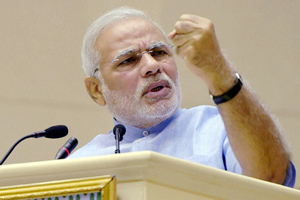New Delhi, Sep 5: On Teachers Day, Prime Minister Narendra Modi today interacted with school children across the country saying girl education is his top priority and the initiative to ensure toilets in all schools was part of this endeavour.
Addressing students and replying to their questions via video conferencing in the first-ever initiative, he said he is talking to states to ensure that schools are set up near the homes of girl children to ensure reduction in their dropouts.
The Prime Minister stressed on increasing the importance of teaching profession and suggested that all educated, including engineers and doctors, should take classes to make teaching a people's movement necessary for nation-building.
He said the country is facing shortage of teachers and this needs to be changed so that India can "export" teachers.
Lauding girls for excelling in all fields, Modi said educating them means educating two families - parental as well as in-laws but regretted the high drop-out rate. "Educating girls is my priority," he asserted.
Referring to his Independence Day address in which he talked about providing toilets in every school, he said the initiative was aimed at curbing dropout.
"I have noticed that girls drop out of schools by the time they reach class 3rd or 4th just because schools don't have separate toilets for them. They don't feel comfortable. There should be toilets for boys and girls in all schools. We should concentrate on girl students not quitting schools," he said.
Talking about his "Digital India" campaign, Modi asked teachers to make best use of technology in teaching without any discrimination and keeping them away from technology would be considered as a "social crime".
During the 90-minute interaction televised live, the 63- year-old Modi talked about his childhood narrating anecdotes and pranks qwith an emphasis that children should not lose their childhood and should inculcate the habit of reading as well as cleanliness.
The Prime Minister also gave a peep into his own personality by saying he was a "task master" who works hard himself and makes others also work hard.
Giving a pep talk to the students as well as teachers, the Prime Minister emphasised on building respect for the profession of teaching, character building, ensuring cleanliness and skill development.
In this context, he drew comparison with Japan which he visited a few days back and said in that country immense emphasis is laid on cleanliness with teachers and students at times jointly cleaning up the school premises.
"When I was told about it, I said I will have to ask the media.. (because) in Gujarat, when I was the Chief Minister, once students of a school did some cleaning up of school premises and much hue and cry was raised by the media over it," Modi said.
He asked the students to work for fulfilling their dreams and asked teachers not to discriminate with their students on the basis of their capabilities and treat them equally like a mother treats all her children.
Asking children to imbibe the Japanese way which he experienced recently, he said, "They stress on learning. They treat their children equally. Technology is used to the optimum and there is focus on developing a scientific temperament, discipline, cleanliness and respect for all among children."
Asked by a Manipur student on how he can become the Prime Minister, Modi told him to prepare to contest for the 2024 polls while saying it is possible for anyone to be so in a democracy.
He said he does not treat politics as a profession but service. He also said that one should not do things for achieving "gains".





Comments
Add new comment